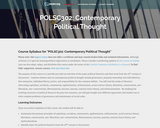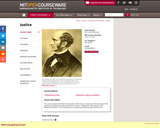The purpose of this course is to provide the student with an overview of the major political theorists and their work from the 18th century to the present. Common themes seen in contemporary political thought include governance, property ownership and redistribution, free enterprise, individual liberty, justice, and responsibility for the common welfare. The student will read the works of theorists advocating capitalism, socialism, communism, egalitarianism, utilitarianism, social contract theory, liberalism, conservatism, neo-liberalism, neo-conservatism, libertarianism, fascism, anarchy, rational choice theory, and globalism. By studying the evolving constructs of political theory in the past two centuries, the student will gain insight into different approaches that leaders use to solve complex problems of governance and maintenance of social order. Upon successful completion of this course, the student will be able to: summarize the primary principles of capitalism, socialism, communism, egalitarianism, utilitarianism, social contract theory, liberalism, conservatism, neo-liberalism, neo-conservatism, libertarianism, fascism, anarchy, terrorism, rational choice theory, and globalism; identify major the political theorists from the 188h century to the present; discuss major political movements in their respective historical contexts; assess the impact that various political movements have had on law, economics, international relations, and society; analyze various primary sources of political theory and understand how these theories can be applied to solve problems in society; understand the challenges that modern leaders face in framing political debate and public policy. (Political Science 302)






